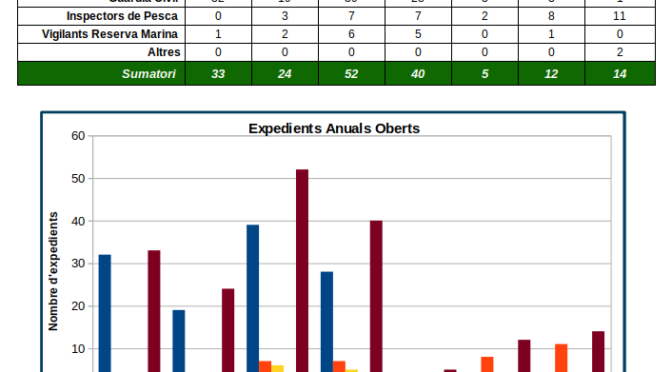Views: 184
It seems that any effective surveillance on fishing has produced few results in Menorca. As in each year, GOB has asked for the disciplinary proceedings on file for 2021 and we have found a picture similar to the three previous years with only 14 proceedings on file open.
Each year, GOB has asked for disciplinary fishing proceedings on file not only any processed by the Island Governing Council but also those processed by the General Directorate on Fishing regarding commercial fishing. However, these figures are still very low bearing in mind that Menorca has various security bodies that can exert an active control over fishing: two Fisheries Inspectors of the Island Governing Council, three Fishing Monitors for the Marine Reserve of North Menorca, and the agents of the Guardia Civil (SEPRONA – Protection Service of Nature) including the local police of each municipality.
Of all the agents involved, the ones with the most activity are the Fisheries Inspectors who proposed 11 of the 14 sanctioned proceedings on file. SEPRONA, one of the bodies that used to be the most active until 2018, seems to have abandoned fishing controls, as in the last three years it has been reducing the number of filed proceedings from 39 in 2017 to only one proposed sanction in 2021.
For its part, the Monitoring Service of the Marine Reserve along the North of Menorca continues with no sanctions in 2021 and that is because in the last three years this security body, which consists of three personnel and its own boat, has only recently opened a file for disciplinary proceedings concerning fishing matters. Although a report in 2021 alleges that this service conducted numerous reviews on professional and recreational fishing, it did not issue any records of its activities during that year. Another surprising piece of information from the report is that during 2021, the boat went out to sea on only 21 days.
Of the 14 files, there are 7 that refer to commercial fishing. Sanctions are between 800 to 20,000 euros and are reduced by 50% if paid within the first few days. All are related to the marketing of lobsters without accreditation, that is to say the selling of lobsters without a flange that shows that it has been fished legally in Menorcan waters.
The other 7 proceedings have very modest fines, between 151 and 400 euros.
It could be read that the low number of disciplinary proceedings comes from the public behaving correctly at the time of carrying out any extractive activities from the sea. However, this is not the feeling of any of the agents involved in the area, nor does the marine life confirm any good management to support this supposition.
A useful tool that GOB employs to see the evolution of the fish populations and asses the pressure caused by illegal fishing, is the monitoring of fish populations in shallow waters of the Marine Reserve of the North of Menorca. This is done by the Directorate General of Fishing and the Marine Environment every two years.
From these studies can be seen various evolutionary parameters, such as the biomass of fishes since the year 2000, and they allow comparison of these same parameters within the Integral Reserve (where fishing and shell fishing are prohibited), the Partial Reserve (where fishing and shell fishing are regulated) and outside the Reserve where there is no type of regulation.
Unfortunately, in 2021, only the tracking of fish in the Integral Reserve was made, so we are not able to make a comparison of monitoring in the other areas. However, the study of 2021 does show a decrease in the medium biomass (3.6 Kg) compared with the 2019 study (5.0 Kg), though the figure is higher than that registered in 2017 (2.9 Kg). It should be noted that this occurred in the Integral Reserve area where no extractive activity is permitted.
In short, it seems that the marine environment of Menorca, that is now the Reserve of the Biosphere with the largest marine area in the Mediterranean, still has pending the monitoring of its waters. The responsibility is already that of the Island Governing Council but, if it is not reinforced with technology and decision, it will translate into a progressive loss of marine biodiversity.

